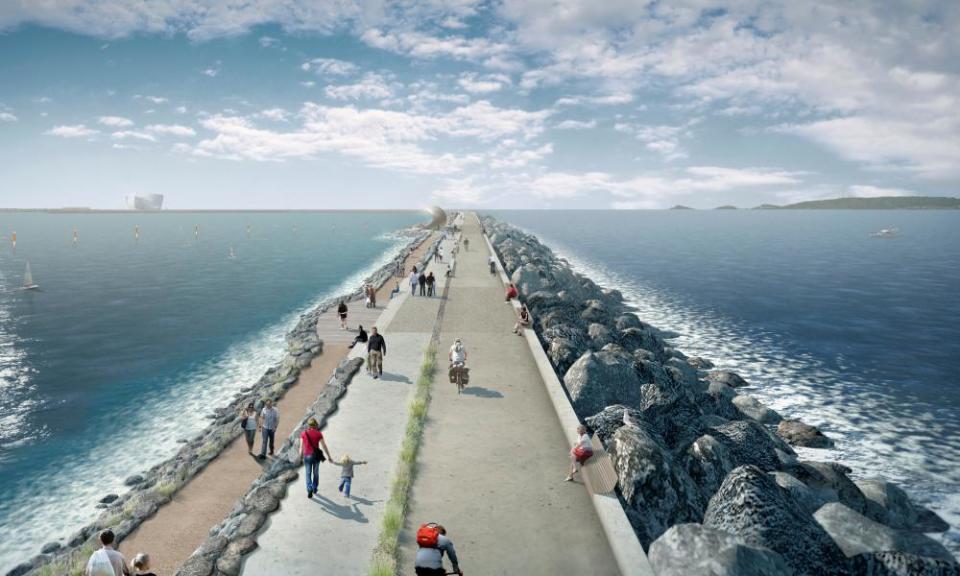Government rejects plan for £1.3bn tidal lagoon in Swansea

The government has rejected plans for a £1.3bn tidal lagoon in Swansea Bay, dashing industry hopes of Britain leading development of a new source of renewable energy and sparking widespread criticism.
Ministers said the project, which would have been subsidised through household energy bills for decades, was too expensive compared with alternatives such as offshore windfarms and nuclear power.
The business secretary, Greg Clark, told parliament he had “left no stone unturned” in considering whether to support the scheme.
“The inescapable conclusion of an extensive analysis is, however novel and appealing the proposal that has been made is … the cost that would be incurred by consumers and taxpayers would be so much higher than alternative sources of low-carbon power that it would be irresponsible to enter into a contract with the provider,” he said.
Clark said backing the lagoon would cost the average consumer £700 more by 2050, compared with a mix of offshore wind and nuclear power. The capital cost for the lagoon, per unit of electricity generated, would be more than three times as much as the Hinkley Point C power station, he said.
The minister said the government’s analysis had concluded there was little potential for cost reductions from future lagoons and limited local economic benefits.
However, the long-awaited decision was condemned by the renewable energy industry, green groups and MPs. Mark Shorrock, the chief executive of the company behind the project, Tidal Lagoon Power, accused Clark of being misinformed.
“This is a vote of no interest in Wales, no confidence in British manufacturing and no care for the planet,” he said.
Labour said it was “remarkably ironic” that the announcement came on the same day as a vote on Heathrow airport expansion.
Rebecca Long-Bailey, the shadow business secretary, said: “Once again the Tories have defied all logic and failed to make the right decision for our economy, the people of Wales and the future of our planet.”
Carolyn Harris, the Labour MP for Swansea East, where the lagoon would have been based, told Clark: “You will never understand the frustration and anger felt in our city today.”
Plaid Cymru, the Welsh nationalist party, formally tabled a vote of no confidence in the secretary of state for Wales, Alun Cairns, at the Welsh assembly. The Plaid assembly member Simon Thomas said: “The UK government has time and time again failed to invest in Wales.
“The failed electrification of Wales’ railways, and now the rejection of the tidal lagoon prove that the secretary of state for Wales has no credibility and is not fit to represent Wales in public office. He must resign at once.”
The trade body RenewableUK said it was disappointed by the rejection, while the Green party co-leader Caroline Lucas said it was “a double blow” because jobs and green energy production would be lost.
Clark defended the government’s stance, saying it believed in renewable energy. He disclosed that he had more than 10 meetings this year alone with the Welsh government, which had offered a £200m equity stake or loan to make the project viable.
Clark’s statement comes nearly 18 months after an independent government review strongly backed the scheme.
Charles Hendry, the report’s author and a former energy minister, said the Swansea project would add the cost of only a pint of milk to annual energy bills and provide predictable, low-carbon electricity.
Hendry told the Guardian that the government had failed to recognise the longer lifetime of lagoons compared to alternatives. “The offshore wind turbines will have to have been replaced three or four times during the lifetime of a lagoon; a nuclear plant would only last half as long,” he said.
The project’s dismissal comes shortly after ministers said they were considering taking a multibillion-pound stake in a new nuclear power station at Wylfa in Wales. That reversed a decades-long policy of avoiding direct state ownership and will have made it possible to aim for a subsidy price much lower than the lagoon’s.
The Swansea scheme’s planned generating capacity is about a 10th of Wylfa but backers said it could be followed by five large-scale lagoons, providing a home-grown source of renewable energy, jobs and an export opportunity.
Gloucester-based Tidal Lagoon Power had hoped to agree a guaranteed power price with the government – known as a contract for difference – for the “pathfinder” lagoon at Swansea.
The Swansea project envisaged a U-shaped breakwater built across the bay and the tide passing through 16 turbines, generating power for 155,000 homes. First proposed in 2011, the lagoon won backing from the then chancellor George Osborne, who used his 2015 budget to announce the government was commencing negotiations with Tidal Lagoon Power for the plan.
Clark insisted that if future tidal lagoons could demonstrate value for money, the government would consider them.
However, industry observers think Monday’s rejection is likely to kill off prospects for any future lagoons in the UK. Other technologies that harness the power of the tides are still seen as having potential.

 Yahoo Finance
Yahoo Finance 